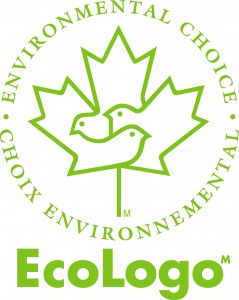Each time I go out shopping I’m bombarded with all kinds of environmentally focused marketing claims. Everything from “all natural” to “EcoLogo certified” – and that’s just the tip of the iceberg. With the growing emphasis on environmental concerns, environmentally-focused marketing has exploded. This has led to the proliferation of hundreds of different claims, labels, and certifications that promote a good or service’s so-called “green” qualities. While this is a step in the right direction, the sheer number of certifications out there can make finding the right product daunting. So what’s the savvy shopper to do? Get informed! Here’s a brief guide to eco-labelling to shed some light on the labels that exist and how to evaluate their claims.
There are two main types of labels that you’re likely to see while running your weekly errands. The first are self-declarations about a product or service made by manufacturers, suppliers, distributors, etc. Generally they are based on one attribute and are not independently verified. Labels that fall into this category include claims such as “VOC free,” “contains recycled content,” and “all natural.” The second are eco-labels awarded by third party organizations that evaluate goods and services based on certain criteria. If a product meets this standard it’s awarded a license to use the label. Common eco-labels include Fairtrade, EcoLogo, and Rainforest Alliance. While this is all well and good, what exactly do these labels mean?
EcoLogo is a pioneer of eco-labels, founded in 1988 and recognized across North America. Certified items undergo a multi-attribute analysis that examines the product’s lifecycle from production to end of use. EcoLogo does not have one standard set of criteria, but rather different standards particular to each product category. Certifications are available in industries such as electronics, toys, office supplies, renewable energy, furniture, and building materials. All certified products must demonstrate adherence to the standard through verification from a third party auditor.
Fairtrade
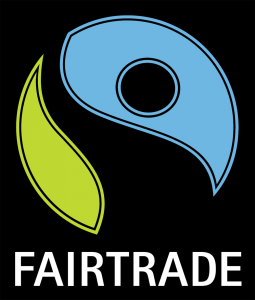 Fairtrade is an international certification system predominantly for food and textile products such as coffee, flowers, cotton, nuts, and oils. It is run by Fairtrade International. The program sets out specifications for businesses and producers who buy products from workers and farmers in developing nations in an effort to provide a more meaningful and fair business relationship. Criteria considered include product pricing, premiums, safe working conditions, environmental considerations, and farmer access to credit and contracts. A third party audits the products bearing the Fairtrade label to ensure compliance with this standard.
Fairtrade is an international certification system predominantly for food and textile products such as coffee, flowers, cotton, nuts, and oils. It is run by Fairtrade International. The program sets out specifications for businesses and producers who buy products from workers and farmers in developing nations in an effort to provide a more meaningful and fair business relationship. Criteria considered include product pricing, premiums, safe working conditions, environmental considerations, and farmer access to credit and contracts. A third party audits the products bearing the Fairtrade label to ensure compliance with this standard.
Forest Stewardship Council
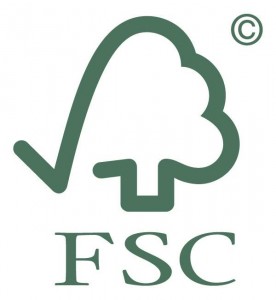 The Forest Stewardship Council (FSC) was founded in 1990 and offers a certification system for forest products. There are two programs under which products can be certified. The first is “Chain of Custody Certification” which tracks raw materials through the entire production process. The second is “Forest Management Certification” which looks at responsible forest management. Companies who have achieved FSC certification have gone through an initial on-site audit and then annual surveillance audits to ensure the standard is continually being properly applied. A third party conducts all audits, and certifications are valid for five years.
The Forest Stewardship Council (FSC) was founded in 1990 and offers a certification system for forest products. There are two programs under which products can be certified. The first is “Chain of Custody Certification” which tracks raw materials through the entire production process. The second is “Forest Management Certification” which looks at responsible forest management. Companies who have achieved FSC certification have gone through an initial on-site audit and then annual surveillance audits to ensure the standard is continually being properly applied. A third party conducts all audits, and certifications are valid for five years.
Sustainable Forestry Initiative
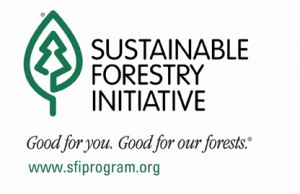 Sustainable Forestry Imitative (SFI) was founded in 1994 and focuses on products from the North American logging industry. Similar to the FSC’s system, there are two types of SFI certifications. The first is “Certified Chain of Custody” which monitors the wood fibres used from production through to the final product. The second is “Certified Sourcing” which indicates that the product’s materials come from a company that has meet SFI’s objectives by sourcing their raw materials responsibly, even though the source of the materials is not certified itself. A third party must audit organizations using the SFI logo to confirm their adherence to the program.
Sustainable Forestry Imitative (SFI) was founded in 1994 and focuses on products from the North American logging industry. Similar to the FSC’s system, there are two types of SFI certifications. The first is “Certified Chain of Custody” which monitors the wood fibres used from production through to the final product. The second is “Certified Sourcing” which indicates that the product’s materials come from a company that has meet SFI’s objectives by sourcing their raw materials responsibly, even though the source of the materials is not certified itself. A third party must audit organizations using the SFI logo to confirm their adherence to the program.
Rainforest Alliance
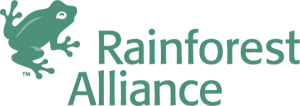 The Rainforest Alliance is a comprehensive system that assesses products and services from the forestry, agriculture, and tourism industries. The goal of the organization’s certification process is to evaluate operations in regards to environmental protection, workers’ rights, and the well-being of communities and families. A third party auditor must verify conformance to the standard.
The Rainforest Alliance is a comprehensive system that assesses products and services from the forestry, agriculture, and tourism industries. The goal of the organization’s certification process is to evaluate operations in regards to environmental protection, workers’ rights, and the well-being of communities and families. A third party auditor must verify conformance to the standard.
Label Labyrinth: How not to get lost
As always, just because a label denotes something doesn’t necessarily mean that it provides enough information to make a well-informed decision or even that the claim is accurate. This idea is commonly reinforced in comparisons between SFI and FSC certification. While both bodies essentially provide the same type of certifications, the requirements for each are different and SFI is often criticized for the close ties to the lumber industry. One of the best ways to evaluate environmentally-focused marketing claims is to look for green-washing, the use of exaggerated or misleading claims that present a false image of a product or service being environmentally preferable. There are seven common “sins” companies commit that would constitute as green-washing, listed below.
- Hidden Tradeoffs: Hidden tradeoffs typically focus on one attribute of a product that is preferable, while neglecting other factors that may be harmful. One such example is touting use of paper made from recycled content, but that is heavily whitened using bleach. While the paper’s sourcing may be preferable, the use of chlorine is not.
- No Proof: A product or service that makes an environmental claim that cannot be supported falls into this category. For example many plastic products state they are “BPA free,” but have no documentation to support the claim.
- Vagueness: Vagueness is making a broad claim that doesn’t denote a defined characteristic. A product claiming to be “all natural” or “environmentally friendly” would fall into this category because neither really says anything about the product itself. Consider that there are many substances that are naturally occurring that are harmful or poisonous.
- Worshipping False Labels: Any product that uses words or images to lead a consumer to believe the product has been endorsed by a third-party when it hasn’t been would fall into this category. Essentially this is creating a false eco-label.
- Irrelevance: Irrelevant claims are ones that are truthful, but not important to the product or service the claim is being made about. A common claim in this category is products that are chlorofluorocarbon (CFC) free. While CFCs have been recognized as an ozone-depleting substance, they have been phased out and banned in Canada since 1988 when the Montreal Protocol came into effect.
- Lesser of Two Evils: The lesser of two evils is a claim that is accurate for a particular product or service, but may mislead or distract from the impacts of the category of a whole. One example is a sport utility vehicle that is marketed as being fuel-efficient.
- Fibbing: Fibbing tends to occur less commonly and, as the name suggests, consists of a claim that is untrue. This could include products that are falsely labeled as being Energy Star certified.
Next time you’re out shopping take a close look and evaluate the claims of the products and services you purchase. When in doubt, do a little research before you buy.

